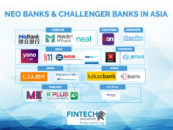
Open Banking and APIs: How Regulators Around the World are Pushing for Innovation
by Fintech News Singapore February 24, 2017Open banking, a term that refers to the use of open APIs to allow banks to share information securely and provide customers with even higher levels of convenience and personalized financial advice, is an emerging trend in the banking space to watch very closely, according to Olivier Berthier, CEO and co-founder Moneythor.

Olivier Berthier, CEO and co-founder of Moneythor, via Linkedin
“Regulators across the globe mandating banks to share information about their customers’ accounts and transactions in order to enable them to access new innovative services from third-parties, is the talk of the town. It is around the corner in Europe with the revised Payments Services Directive (PSD2) coming into force in January 2018,” Berthier told Fintechnews.
“Meanwhile, here in Singapore, the Monetary Authority of Singapore is very vocal about encouraging financial institutions to adopt APIs as a key foundation layer for innovation and interoperability.”
In 2015, the EU-wide PSD2 law was passed to force banks to open up access to their payment facilities and information in order to allow customers to access and share more data with third-party services, enabling them to manage their money through services other than their bank.
Once banks open up access to their data, customers will be able to see all of their accounts, investments, mortgages and pensions in one website or application known as an Account Information Service Provider (AISP).
Open banking will also see the introduction of Payment Initiation Service Providers (PISPs). PISPs will act as a bridge between the customer’s account and the retailer’s account, bypassing typical payment products.
The UK, in particular, has been very active on the open banking front, which it believes will improve choice for customers, promote competition and stimulate innovation.
In February 2016, the Open Banking Working Group (OBWG) published its framework for the UK Open Banking Standard. It seeks to create an open API for data that’s shared, including, but not limited to, customer data, as well as an open data API for market information and relevant open data.
Open banking and open infrastructure will provide new opportunities to startups, corporates and banks, but also introduce numerous competitors into the market, Berthier said. He expects to see lots of new services being launched very soon.
Jan Reinmueller, head of KPMG Singapore’s Digital Village, agrees. He believes that open APIs were essential for driving the adoption of new technologies, and noted that financial institutions needed to focus on open API platforms to further strengthen the collaboration with fintechs.
Moneythor is part of KPMG Digital Village, an initiative launched by KPMG in 2016 to foster collaboration between corporates and startups. KPMG Digital Village acts as a platform that brings corporates, startups, investors and government bodies together in an ecosystem designed to drive the adoption and integration of innovative solutions.
Digital push
Moneythor is headquartered in Singapore and provides digital banking software components with enhanced marketing and analytics. It has been particularly busy these past months. In addition to having licensed its Moneythor software to additional financial services providers in Asia Pacific and Europe, the company also has a number of ongoing digital banking implementation projects at some of its large customers.
“They all have in common: a pressing need to enhance their digital banking services with rich transaction insights and data-driven personalized recommendations, which is at the core of our solution’s value proposition,” Berthier said. “In the past few months, some of our existing customers, such as DBS Bank, have also further extended their use of our technology to additional digital propositions across their groups, such as new countries and new segments of their client base.”

Image via https://digitalvillage.asia/
“We very much enjoy the breadth of the Digital Village ecosystem and the in-house team’s pragmatism when it comes to dealing with corporates. Every discussion around prototypes and pilots includes their eventual integration and commercialization. It is refreshing in this day and age where too many proof-of-concept projects are implemented with no real next steps in sight,” Berthier said, commenting on his experience at KPMG Digital Village.
While Moneythor’s primary use cases are in the retail and business banking space, the company is also exploring other industries where corporates are looking to deliver more value from their customers’ data, he said.
“With Moneythor on board KPMG Digital Village, we’re looking forward to helping our clients improve customer engagement and loyalty,” said Lyon Poh, head of digital + innovation at KPMG Singapore. “This could be enabling more meaningful transactions through data driven recommendations and contextual insights.”
Reinmueller added that KPMG Digital Village was currently building a new solution on top of the Moneythor core engine that will address a key challenge that clients have identified.
Featured image: Hand drawing and writing API, by zaozaa19, via Shutterstock.com.







